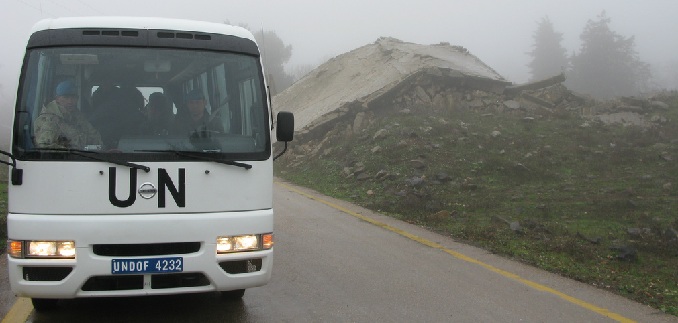Filipino officials disclosed Friday that the country’s Ministry of Foreign Affairs was recommending that the Philippines withdraw its contribution of troops from the U.N. peacekeeping force (UNDOF) responsible for monitoring the border between Syria and Israel. The accouncement comes a few weeks after several Filipino troops stationed along the border were kidnapped by opposition forces battling to overthrow Syria’s Bashar al-Assad regime.
It also comes a day after Austria, which provides nearly one-third of the troops in the 1,000-strong force, announced it would be withdrawing its forces from the mission. The U.N. expressed its regret over the Austrian decision and noted – again – that Austria’s 300 strong contribution to the 1,000-peacekeeper force was the core of the mission:
Ban Ki-moon said today he regrets Austria’s decision to withdraw its troops from the United Nations peacekeeping force in the Golan Heights, which has faced a number of security risks and operational challenges in recent months amid the escalating conflict in Syria… “Austria has been a backbone of the mission and their withdrawal will affect the mission’s operational capacity,” UN spokesperson Martin Nesirky told reporters in New York. “We are in discussions with them about the timing of the withdrawal, and with other troop-contributing countries to provide replacement troops.”
UNDOF monitors had already abandoned several posts along the border due to safety concerns.
Observers now fear that UNDOF may completely collapse and worsen an already significant power vacuum in the area. Yesterday saw sustained fighting near the border as Syrian army forces lost and then recaptured the Quneitra border crossing between Syria and Israel from rebels who had seized it earlier this week. The Syrian side of the Quneitra crossing lies less than 300 feet from Israeli outposts.
Meanwhile, the IDF filed a complaint with the United Nations claiming that Syria maneuvered tanks near the crossing in violation of the ceasefire agreement between the two countries, which bans Damascus from inserting tanks into the demilitarized zone on the border.
Fighting between the Syrian army and opposition forces along the Israeli-Syrian border has become increasingly pitched, and the head of U.N. peacekeeping operations today confirmed multiple incidents in the “extremely confrontational” border region.
UNDOF’s instability may also complicate global diplomacy and geopolitics surrounding the conflict. Early today Russia offered to replace the departing Austrian forces. A U.N. spokesman almost immediately welcomed the offer but it is not clear that the West, which is aligned against Russia in the conflict inasmuch as Russia is supporting the Assad regime, would similarly embrace a scenario under which Moscow would deploy station hundreds of troops in Syria.
By day’s end the U.N. had regretfully declined the Russian offer.
Should UNDOF collapse, it would heighten long-standing skepticism regarding the reliability of U.N. peacekeeping missions in the Near East.
[Photo: Begemot / Flickr]




